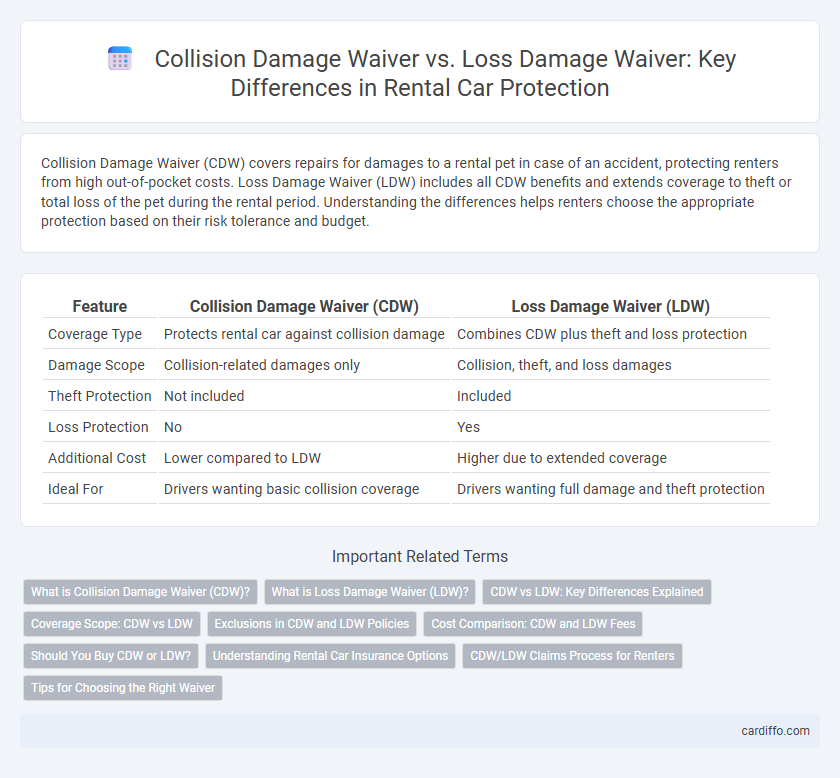Collision Damage Waiver (CDW) covers repairs for damages to a rental pet in case of an accident, protecting renters from high out-of-pocket costs. Loss Damage Waiver (LDW) includes all CDW benefits and extends coverage to theft or total loss of the pet during the rental period. Understanding the differences helps renters choose the appropriate protection based on their risk tolerance and budget.
Table of Comparison
| Feature | Collision Damage Waiver (CDW) | Loss Damage Waiver (LDW) |
|---|---|---|
| Coverage Type | Protects rental car against collision damage | Combines CDW plus theft and loss protection |
| Damage Scope | Collision-related damages only | Collision, theft, and loss damages |
| Theft Protection | Not included | Included |
| Loss Protection | No | Yes |
| Additional Cost | Lower compared to LDW | Higher due to extended coverage |
| Ideal For | Drivers wanting basic collision coverage | Drivers wanting full damage and theft protection |
What is Collision Damage Waiver (CDW)?
Collision Damage Waiver (CDW) is a rental car protection that covers damage to the rental vehicle resulting from collisions, reducing or eliminating the renter's financial responsibility for repair costs. CDW typically excludes coverage for theft, loss, or damage to personal belongings and often comes with specific terms regarding deductibles or exclusions. Understanding the scope of CDW is essential for renters to gauge potential liabilities and whether additional coverage like Loss Damage Waiver (LDW) is necessary for comprehensive protection.
What is Loss Damage Waiver (LDW)?
Loss Damage Waiver (LDW) is a rental car coverage that protects renters from financial responsibility if the rental vehicle is stolen or damaged. Unlike Collision Damage Waiver (CDW), which only covers collision-related damages, LDW typically includes coverage for theft, vandalism, and other types of damage. Renters choosing LDW benefit from comprehensive protection, reducing out-of-pocket expenses during the rental period.
CDW vs LDW: Key Differences Explained
Collision Damage Waiver (CDW) covers damages to the rental vehicle resulting from collisions, excluding liability for other property or injuries, whereas Loss Damage Waiver (LDW) includes CDW coverage plus protection against theft or loss of the vehicle. CDW typically limits renter's financial responsibility for vehicle damage, but LDW provides more comprehensive coverage, reducing out-of-pocket expenses for both collision and non-collision incidents. Understanding these distinctions helps renters choose appropriate protection based on risk tolerance and rental terms.
Coverage Scope: CDW vs LDW
Collision Damage Waiver (CDW) primarily covers damages to the rental vehicle resulting from collisions, excluding theft and liability for third-party injuries or property damage. Loss Damage Waiver (LDW) extends this coverage by including protection against theft, vandalism, and sometimes loss of use fees, offering more comprehensive security for renters. Understanding the differences in coverage scope between CDW and LDW helps renters select the optimal protection based on their risk tolerance and rental policies.
Exclusions in CDW and LDW Policies
Collision Damage Waiver (CDW) policies typically exclude coverage for damage caused by off-road driving, unauthorized drivers, and neglect or intentional damage, leaving renters liable in these scenarios. Loss Damage Waiver (LDW) extends protection by including theft and loss of the rental vehicle but also excludes losses due to driver under the influence, driving on unpaved roads, and violation of rental terms. Understanding these exclusions is crucial for renters to avoid unexpected financial responsibility and ensure comprehensive coverage during the rental period.
Cost Comparison: CDW and LDW Fees
Collision Damage Waiver (CDW) fees typically range from $10 to $30 per day, covering damage to the rental vehicle from collisions, while Loss Damage Waiver (LDW) fees often cost between $15 and $35 per day, providing broader protection that includes theft and vandalism. Rental companies may bundle LDW with other coverages, leading to slightly higher fees compared to standalone CDW. Understanding these cost differences helps renters choose the appropriate coverage based on their budget and risk tolerance.
Should You Buy CDW or LDW?
Choosing between Collision Damage Waiver (CDW) and Loss Damage Waiver (LDW) depends on the level of coverage desired when renting a vehicle. CDW primarily covers damage to the rental car from a collision, while LDW extends protection to include theft and loss in addition to collision damage. Evaluating factors such as rental location, personal insurance coverage, and peace of mind can help determine whether purchasing CDW or LDW is the more appropriate option.
Understanding Rental Car Insurance Options
Collision Damage Waiver (CDW) covers damage to the rental car resulting from a collision, while Loss Damage Waiver (LDW) includes both collision damage and theft protection, offering broader coverage. Understanding these rental car insurance options is essential for renters to avoid unexpected out-of-pocket expenses in case of accidents or theft. Rental agreements and credit card benefits often specify which waiver applies, so reviewing terms carefully ensures appropriate protection during the rental period.
CDW/LDW Claims Process for Renters
Collision Damage Waiver (CDW) and Loss Damage Waiver (LDW) claims for renters typically involve reporting the incident to the rental company, submitting a detailed claim form, and providing supporting evidence such as photos and police reports. Renters must often pay a deductible, which can be recovered upon approval of the claim if the waiver coverage applies. The claims process duration varies but usually ranges from 7 to 30 days depending on the rental company's policies and the completeness of the documentation submitted.
Tips for Choosing the Right Waiver
Selecting the appropriate waiver between Collision Damage Waiver (CDW) and Loss Damage Waiver (LDW) depends on understanding their coverage scope: CDW primarily covers damage to the rental vehicle, while LDW often includes both collision damage and theft protection. Review rental agreements carefully for exclusions, deductibles, and geographic limitations to avoid unexpected costs during an accident or theft event. Opt for waivers backed by reputable providers with clear claims processes to ensure seamless support and financial protection throughout the rental period.
Collision Damage Waiver vs Loss Damage Waiver Infographic

 cardiffo.com
cardiffo.com